Confidentiality, Ethics, and Legal Frameworks in Social Work Law
VerifiedAdded on 2022/10/19
|9
|2063
|284
Essay
AI Summary
This essay analyzes the concept of confidentiality within the context of social work, emphasizing the legal and ethical frameworks that govern it. It begins by referencing the AASW code of ethics and highlights the importance of assessing risk and consulting with professionals before disclosing client information. The essay explores breach of confidentiality, fiduciary relationships, and the equitable doctrine of breach of confidence. It discusses situations where confidentiality may be overridden by public interest or legal mandates, including informed consent and the Privacy Act of 1974. The paper also covers privileged communications, legal privilege, and the Freedom of Information Act 1982, including relevant case examples such as Mann v Carnell. The importance of legal practitioners and other staffs always to consider such matters prior to releasing any confidential information, is also discussed. The essay concludes by underscoring the significance of balancing competing interests and upholding ethical standards in social work practice. The assignment includes references to relevant legal acts, cases, and academic literature.
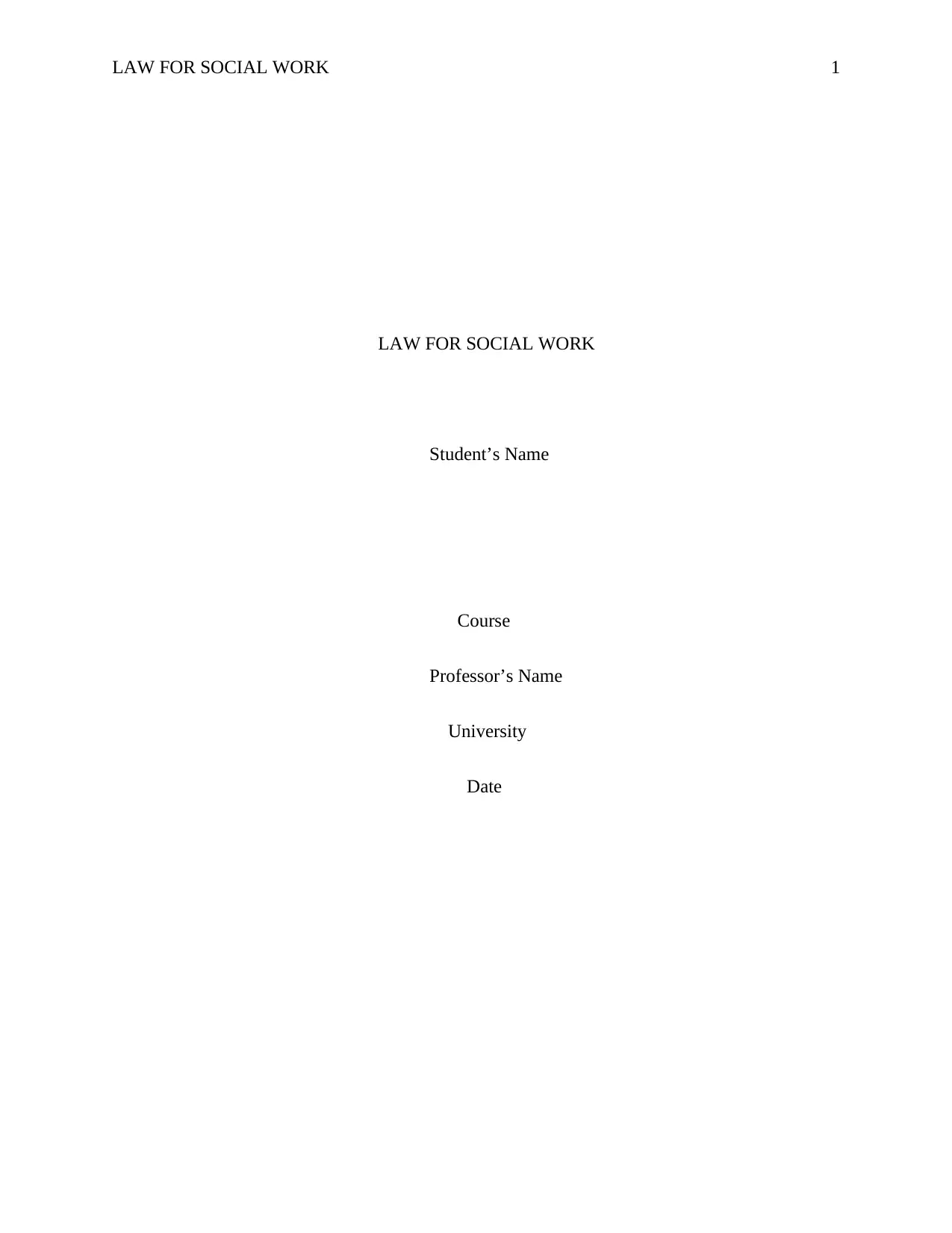
LAW FOR SOCIAL WORK 1
LAW FOR SOCIAL WORK
Student’s Name
Course
Professor’s Name
University
Date
LAW FOR SOCIAL WORK
Student’s Name
Course
Professor’s Name
University
Date
Paraphrase This Document
Need a fresh take? Get an instant paraphrase of this document with our AI Paraphraser
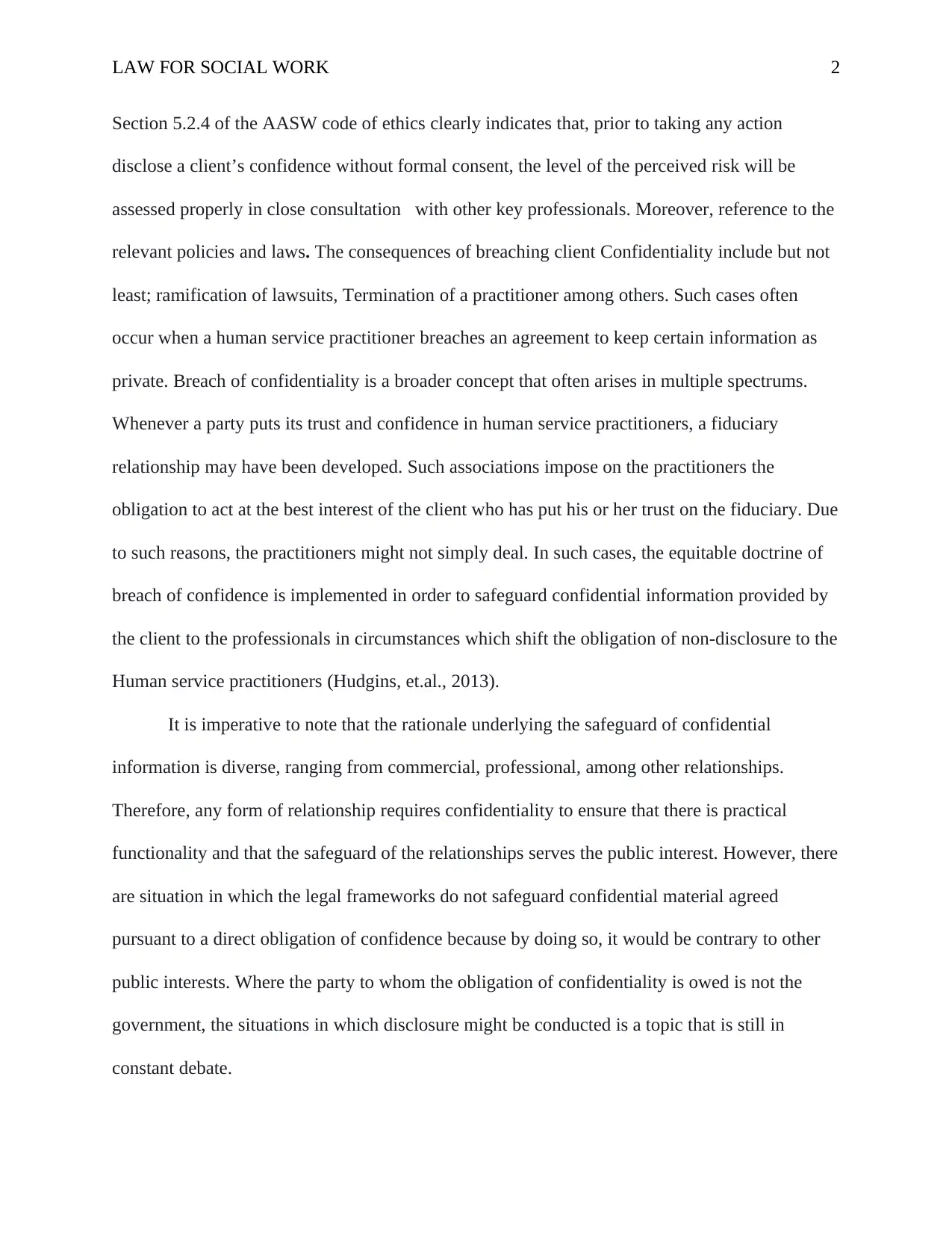
LAW FOR SOCIAL WORK 2
Section 5.2.4 of the AASW code of ethics clearly indicates that, prior to taking any action
disclose a client’s confidence without formal consent, the level of the perceived risk will be
assessed properly in close consultation with other key professionals. Moreover, reference to the
relevant policies and laws. The consequences of breaching client Confidentiality include but not
least; ramification of lawsuits, Termination of a practitioner among others. Such cases often
occur when a human service practitioner breaches an agreement to keep certain information as
private. Breach of confidentiality is a broader concept that often arises in multiple spectrums.
Whenever a party puts its trust and confidence in human service practitioners, a fiduciary
relationship may have been developed. Such associations impose on the practitioners the
obligation to act at the best interest of the client who has put his or her trust on the fiduciary. Due
to such reasons, the practitioners might not simply deal. In such cases, the equitable doctrine of
breach of confidence is implemented in order to safeguard confidential information provided by
the client to the professionals in circumstances which shift the obligation of non-disclosure to the
Human service practitioners (Hudgins, et.al., 2013).
It is imperative to note that the rationale underlying the safeguard of confidential
information is diverse, ranging from commercial, professional, among other relationships.
Therefore, any form of relationship requires confidentiality to ensure that there is practical
functionality and that the safeguard of the relationships serves the public interest. However, there
are situation in which the legal frameworks do not safeguard confidential material agreed
pursuant to a direct obligation of confidence because by doing so, it would be contrary to other
public interests. Where the party to whom the obligation of confidentiality is owed is not the
government, the situations in which disclosure might be conducted is a topic that is still in
constant debate.
Section 5.2.4 of the AASW code of ethics clearly indicates that, prior to taking any action
disclose a client’s confidence without formal consent, the level of the perceived risk will be
assessed properly in close consultation with other key professionals. Moreover, reference to the
relevant policies and laws. The consequences of breaching client Confidentiality include but not
least; ramification of lawsuits, Termination of a practitioner among others. Such cases often
occur when a human service practitioner breaches an agreement to keep certain information as
private. Breach of confidentiality is a broader concept that often arises in multiple spectrums.
Whenever a party puts its trust and confidence in human service practitioners, a fiduciary
relationship may have been developed. Such associations impose on the practitioners the
obligation to act at the best interest of the client who has put his or her trust on the fiduciary. Due
to such reasons, the practitioners might not simply deal. In such cases, the equitable doctrine of
breach of confidence is implemented in order to safeguard confidential information provided by
the client to the professionals in circumstances which shift the obligation of non-disclosure to the
Human service practitioners (Hudgins, et.al., 2013).
It is imperative to note that the rationale underlying the safeguard of confidential
information is diverse, ranging from commercial, professional, among other relationships.
Therefore, any form of relationship requires confidentiality to ensure that there is practical
functionality and that the safeguard of the relationships serves the public interest. However, there
are situation in which the legal frameworks do not safeguard confidential material agreed
pursuant to a direct obligation of confidence because by doing so, it would be contrary to other
public interests. Where the party to whom the obligation of confidentiality is owed is not the
government, the situations in which disclosure might be conducted is a topic that is still in
constant debate.
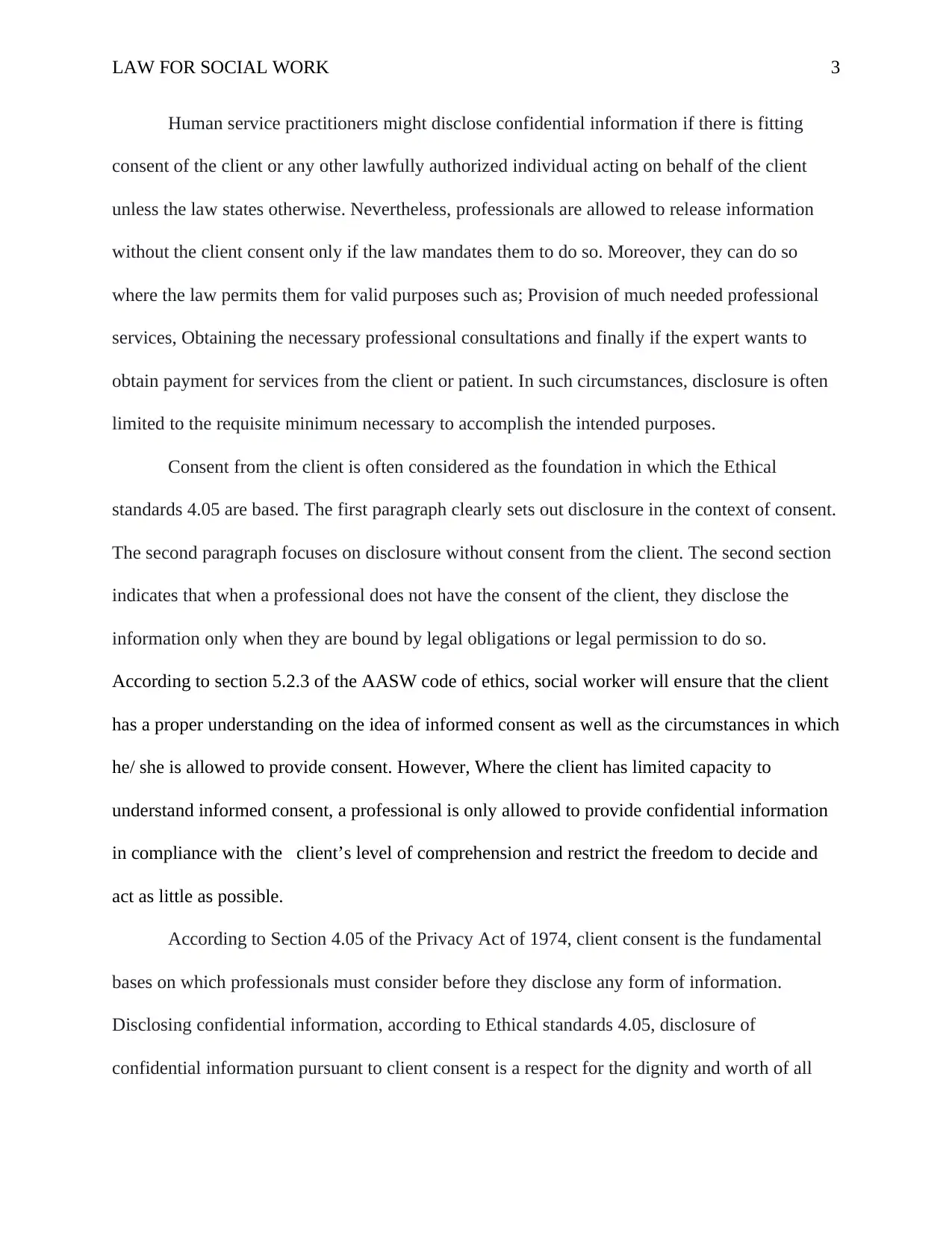
LAW FOR SOCIAL WORK 3
Human service practitioners might disclose confidential information if there is fitting
consent of the client or any other lawfully authorized individual acting on behalf of the client
unless the law states otherwise. Nevertheless, professionals are allowed to release information
without the client consent only if the law mandates them to do so. Moreover, they can do so
where the law permits them for valid purposes such as; Provision of much needed professional
services, Obtaining the necessary professional consultations and finally if the expert wants to
obtain payment for services from the client or patient. In such circumstances, disclosure is often
limited to the requisite minimum necessary to accomplish the intended purposes.
Consent from the client is often considered as the foundation in which the Ethical
standards 4.05 are based. The first paragraph clearly sets out disclosure in the context of consent.
The second paragraph focuses on disclosure without consent from the client. The second section
indicates that when a professional does not have the consent of the client, they disclose the
information only when they are bound by legal obligations or legal permission to do so.
According to section 5.2.3 of the AASW code of ethics, social worker will ensure that the client
has a proper understanding on the idea of informed consent as well as the circumstances in which
he/ she is allowed to provide consent. However, Where the client has limited capacity to
understand informed consent, a professional is only allowed to provide confidential information
in compliance with the client’s level of comprehension and restrict the freedom to decide and
act as little as possible.
According to Section 4.05 of the Privacy Act of 1974, client consent is the fundamental
bases on which professionals must consider before they disclose any form of information.
Disclosing confidential information, according to Ethical standards 4.05, disclosure of
confidential information pursuant to client consent is a respect for the dignity and worth of all
Human service practitioners might disclose confidential information if there is fitting
consent of the client or any other lawfully authorized individual acting on behalf of the client
unless the law states otherwise. Nevertheless, professionals are allowed to release information
without the client consent only if the law mandates them to do so. Moreover, they can do so
where the law permits them for valid purposes such as; Provision of much needed professional
services, Obtaining the necessary professional consultations and finally if the expert wants to
obtain payment for services from the client or patient. In such circumstances, disclosure is often
limited to the requisite minimum necessary to accomplish the intended purposes.
Consent from the client is often considered as the foundation in which the Ethical
standards 4.05 are based. The first paragraph clearly sets out disclosure in the context of consent.
The second paragraph focuses on disclosure without consent from the client. The second section
indicates that when a professional does not have the consent of the client, they disclose the
information only when they are bound by legal obligations or legal permission to do so.
According to section 5.2.3 of the AASW code of ethics, social worker will ensure that the client
has a proper understanding on the idea of informed consent as well as the circumstances in which
he/ she is allowed to provide consent. However, Where the client has limited capacity to
understand informed consent, a professional is only allowed to provide confidential information
in compliance with the client’s level of comprehension and restrict the freedom to decide and
act as little as possible.
According to Section 4.05 of the Privacy Act of 1974, client consent is the fundamental
bases on which professionals must consider before they disclose any form of information.
Disclosing confidential information, according to Ethical standards 4.05, disclosure of
confidential information pursuant to client consent is a respect for the dignity and worth of all
⊘ This is a preview!⊘
Do you want full access?
Subscribe today to unlock all pages.

Trusted by 1+ million students worldwide
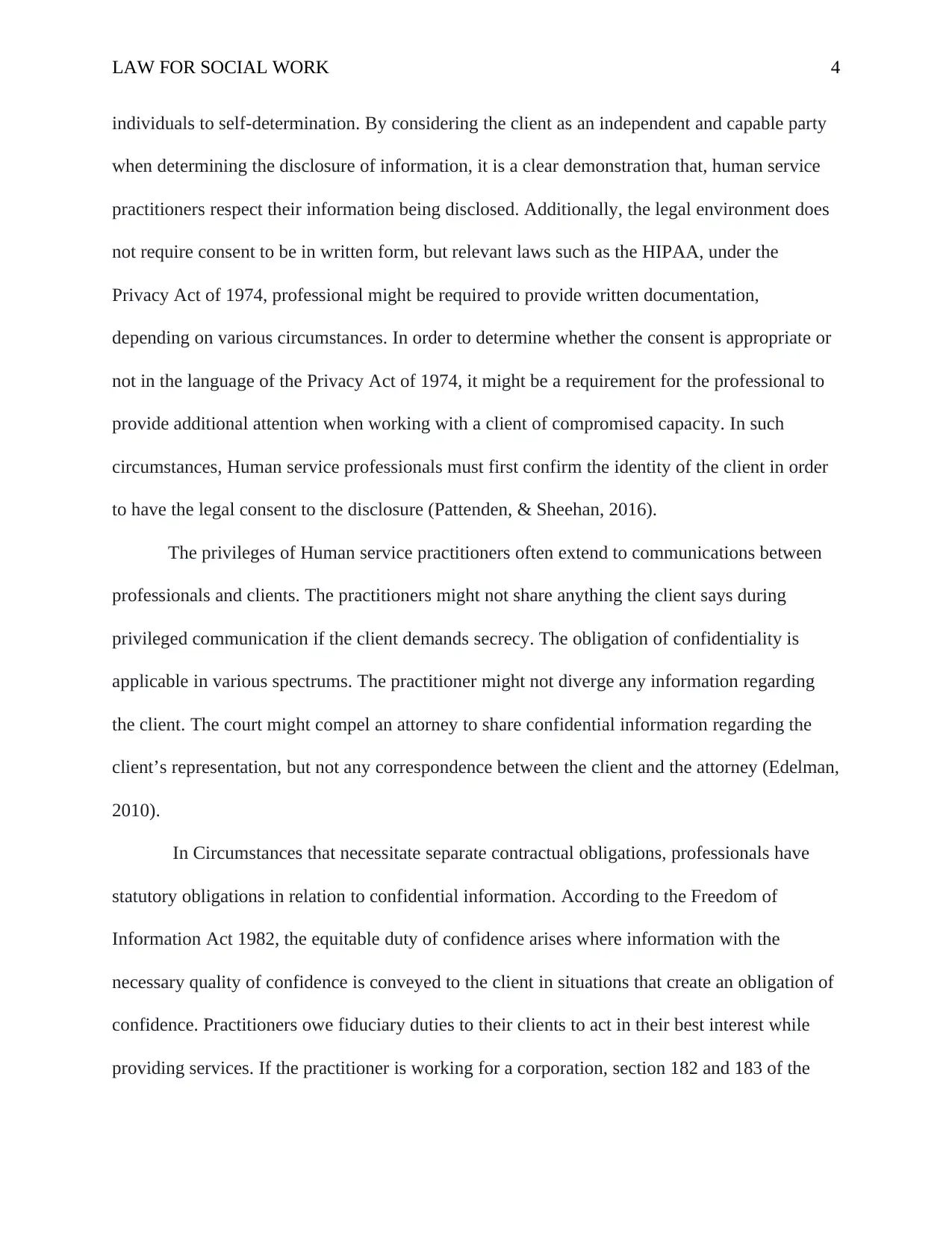
LAW FOR SOCIAL WORK 4
individuals to self-determination. By considering the client as an independent and capable party
when determining the disclosure of information, it is a clear demonstration that, human service
practitioners respect their information being disclosed. Additionally, the legal environment does
not require consent to be in written form, but relevant laws such as the HIPAA, under the
Privacy Act of 1974, professional might be required to provide written documentation,
depending on various circumstances. In order to determine whether the consent is appropriate or
not in the language of the Privacy Act of 1974, it might be a requirement for the professional to
provide additional attention when working with a client of compromised capacity. In such
circumstances, Human service professionals must first confirm the identity of the client in order
to have the legal consent to the disclosure (Pattenden, & Sheehan, 2016).
The privileges of Human service practitioners often extend to communications between
professionals and clients. The practitioners might not share anything the client says during
privileged communication if the client demands secrecy. The obligation of confidentiality is
applicable in various spectrums. The practitioner might not diverge any information regarding
the client. The court might compel an attorney to share confidential information regarding the
client’s representation, but not any correspondence between the client and the attorney (Edelman,
2010).
In Circumstances that necessitate separate contractual obligations, professionals have
statutory obligations in relation to confidential information. According to the Freedom of
Information Act 1982, the equitable duty of confidence arises where information with the
necessary quality of confidence is conveyed to the client in situations that create an obligation of
confidence. Practitioners owe fiduciary duties to their clients to act in their best interest while
providing services. If the practitioner is working for a corporation, section 182 and 183 of the
individuals to self-determination. By considering the client as an independent and capable party
when determining the disclosure of information, it is a clear demonstration that, human service
practitioners respect their information being disclosed. Additionally, the legal environment does
not require consent to be in written form, but relevant laws such as the HIPAA, under the
Privacy Act of 1974, professional might be required to provide written documentation,
depending on various circumstances. In order to determine whether the consent is appropriate or
not in the language of the Privacy Act of 1974, it might be a requirement for the professional to
provide additional attention when working with a client of compromised capacity. In such
circumstances, Human service professionals must first confirm the identity of the client in order
to have the legal consent to the disclosure (Pattenden, & Sheehan, 2016).
The privileges of Human service practitioners often extend to communications between
professionals and clients. The practitioners might not share anything the client says during
privileged communication if the client demands secrecy. The obligation of confidentiality is
applicable in various spectrums. The practitioner might not diverge any information regarding
the client. The court might compel an attorney to share confidential information regarding the
client’s representation, but not any correspondence between the client and the attorney (Edelman,
2010).
In Circumstances that necessitate separate contractual obligations, professionals have
statutory obligations in relation to confidential information. According to the Freedom of
Information Act 1982, the equitable duty of confidence arises where information with the
necessary quality of confidence is conveyed to the client in situations that create an obligation of
confidence. Practitioners owe fiduciary duties to their clients to act in their best interest while
providing services. If the practitioner is working for a corporation, section 182 and 183 of the
Paraphrase This Document
Need a fresh take? Get an instant paraphrase of this document with our AI Paraphraser
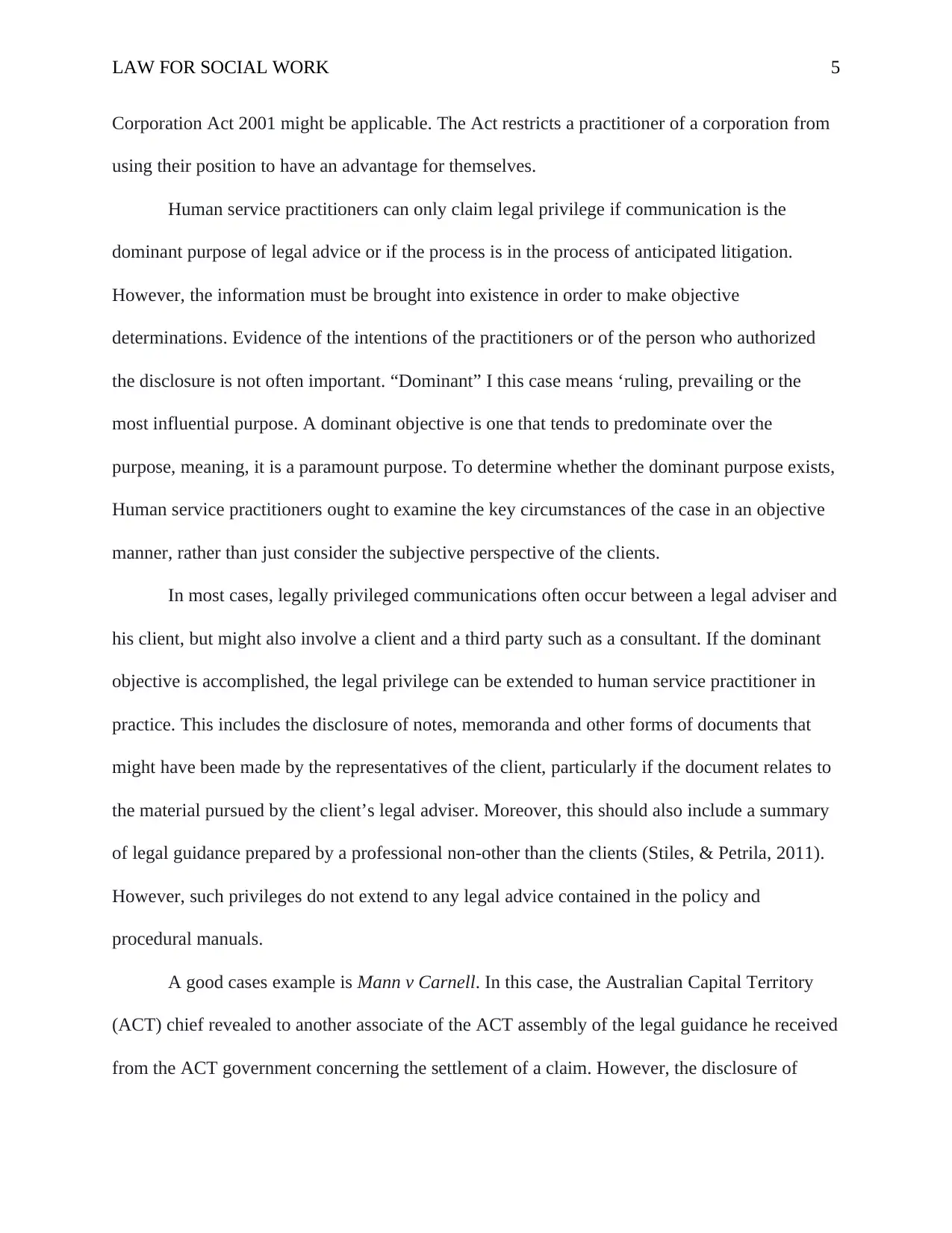
LAW FOR SOCIAL WORK 5
Corporation Act 2001 might be applicable. The Act restricts a practitioner of a corporation from
using their position to have an advantage for themselves.
Human service practitioners can only claim legal privilege if communication is the
dominant purpose of legal advice or if the process is in the process of anticipated litigation.
However, the information must be brought into existence in order to make objective
determinations. Evidence of the intentions of the practitioners or of the person who authorized
the disclosure is not often important. “Dominant” I this case means ‘ruling, prevailing or the
most influential purpose. A dominant objective is one that tends to predominate over the
purpose, meaning, it is a paramount purpose. To determine whether the dominant purpose exists,
Human service practitioners ought to examine the key circumstances of the case in an objective
manner, rather than just consider the subjective perspective of the clients.
In most cases, legally privileged communications often occur between a legal adviser and
his client, but might also involve a client and a third party such as a consultant. If the dominant
objective is accomplished, the legal privilege can be extended to human service practitioner in
practice. This includes the disclosure of notes, memoranda and other forms of documents that
might have been made by the representatives of the client, particularly if the document relates to
the material pursued by the client’s legal adviser. Moreover, this should also include a summary
of legal guidance prepared by a professional non-other than the clients (Stiles, & Petrila, 2011).
However, such privileges do not extend to any legal advice contained in the policy and
procedural manuals.
A good cases example is Mann v Carnell. In this case, the Australian Capital Territory
(ACT) chief revealed to another associate of the ACT assembly of the legal guidance he received
from the ACT government concerning the settlement of a claim. However, the disclosure of
Corporation Act 2001 might be applicable. The Act restricts a practitioner of a corporation from
using their position to have an advantage for themselves.
Human service practitioners can only claim legal privilege if communication is the
dominant purpose of legal advice or if the process is in the process of anticipated litigation.
However, the information must be brought into existence in order to make objective
determinations. Evidence of the intentions of the practitioners or of the person who authorized
the disclosure is not often important. “Dominant” I this case means ‘ruling, prevailing or the
most influential purpose. A dominant objective is one that tends to predominate over the
purpose, meaning, it is a paramount purpose. To determine whether the dominant purpose exists,
Human service practitioners ought to examine the key circumstances of the case in an objective
manner, rather than just consider the subjective perspective of the clients.
In most cases, legally privileged communications often occur between a legal adviser and
his client, but might also involve a client and a third party such as a consultant. If the dominant
objective is accomplished, the legal privilege can be extended to human service practitioner in
practice. This includes the disclosure of notes, memoranda and other forms of documents that
might have been made by the representatives of the client, particularly if the document relates to
the material pursued by the client’s legal adviser. Moreover, this should also include a summary
of legal guidance prepared by a professional non-other than the clients (Stiles, & Petrila, 2011).
However, such privileges do not extend to any legal advice contained in the policy and
procedural manuals.
A good cases example is Mann v Carnell. In this case, the Australian Capital Territory
(ACT) chief revealed to another associate of the ACT assembly of the legal guidance he received
from the ACT government concerning the settlement of a claim. However, the disclosure of
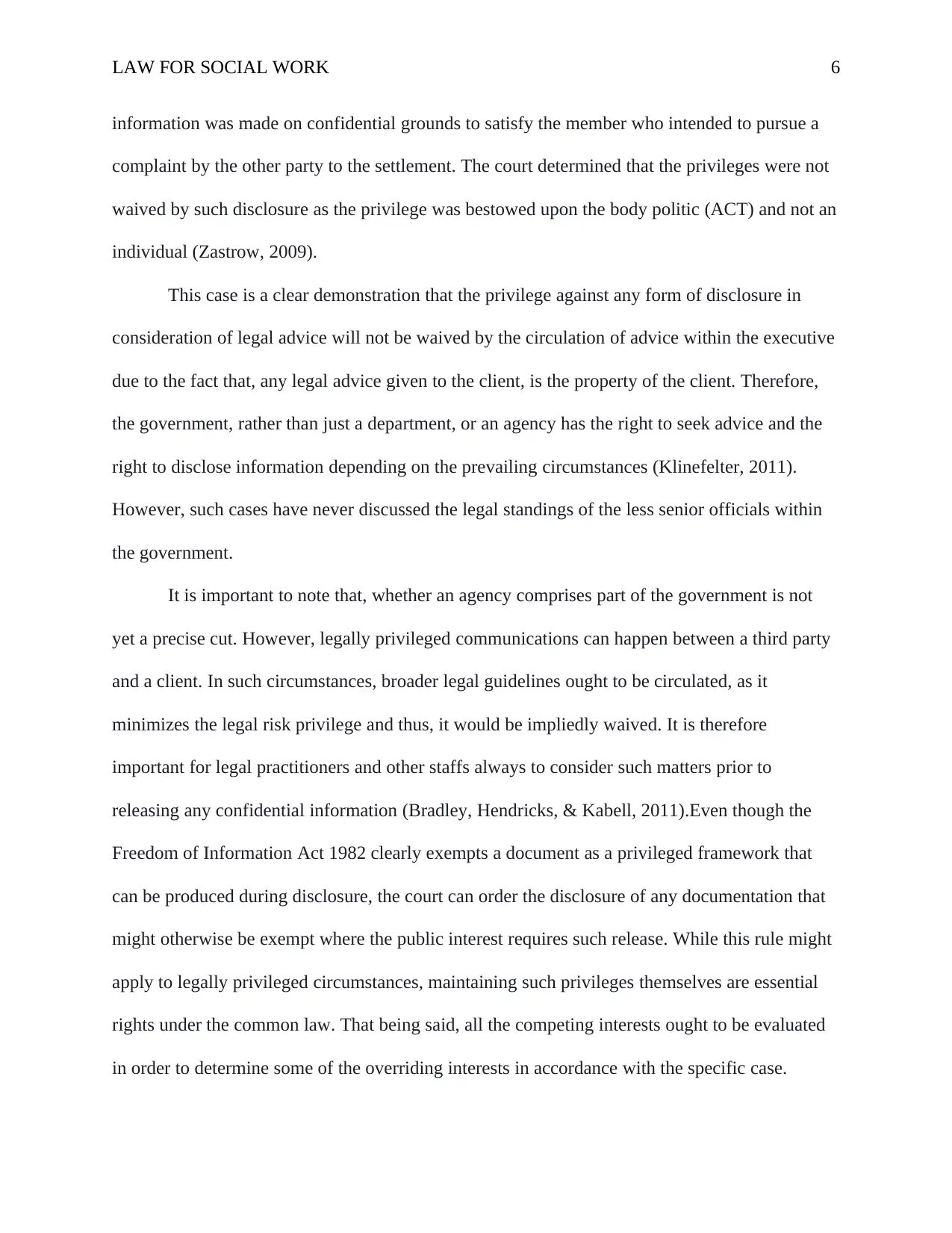
LAW FOR SOCIAL WORK 6
information was made on confidential grounds to satisfy the member who intended to pursue a
complaint by the other party to the settlement. The court determined that the privileges were not
waived by such disclosure as the privilege was bestowed upon the body politic (ACT) and not an
individual (Zastrow, 2009).
This case is a clear demonstration that the privilege against any form of disclosure in
consideration of legal advice will not be waived by the circulation of advice within the executive
due to the fact that, any legal advice given to the client, is the property of the client. Therefore,
the government, rather than just a department, or an agency has the right to seek advice and the
right to disclose information depending on the prevailing circumstances (Klinefelter, 2011).
However, such cases have never discussed the legal standings of the less senior officials within
the government.
It is important to note that, whether an agency comprises part of the government is not
yet a precise cut. However, legally privileged communications can happen between a third party
and a client. In such circumstances, broader legal guidelines ought to be circulated, as it
minimizes the legal risk privilege and thus, it would be impliedly waived. It is therefore
important for legal practitioners and other staffs always to consider such matters prior to
releasing any confidential information (Bradley, Hendricks, & Kabell, 2011).Even though the
Freedom of Information Act 1982 clearly exempts a document as a privileged framework that
can be produced during disclosure, the court can order the disclosure of any documentation that
might otherwise be exempt where the public interest requires such release. While this rule might
apply to legally privileged circumstances, maintaining such privileges themselves are essential
rights under the common law. That being said, all the competing interests ought to be evaluated
in order to determine some of the overriding interests in accordance with the specific case.
information was made on confidential grounds to satisfy the member who intended to pursue a
complaint by the other party to the settlement. The court determined that the privileges were not
waived by such disclosure as the privilege was bestowed upon the body politic (ACT) and not an
individual (Zastrow, 2009).
This case is a clear demonstration that the privilege against any form of disclosure in
consideration of legal advice will not be waived by the circulation of advice within the executive
due to the fact that, any legal advice given to the client, is the property of the client. Therefore,
the government, rather than just a department, or an agency has the right to seek advice and the
right to disclose information depending on the prevailing circumstances (Klinefelter, 2011).
However, such cases have never discussed the legal standings of the less senior officials within
the government.
It is important to note that, whether an agency comprises part of the government is not
yet a precise cut. However, legally privileged communications can happen between a third party
and a client. In such circumstances, broader legal guidelines ought to be circulated, as it
minimizes the legal risk privilege and thus, it would be impliedly waived. It is therefore
important for legal practitioners and other staffs always to consider such matters prior to
releasing any confidential information (Bradley, Hendricks, & Kabell, 2011).Even though the
Freedom of Information Act 1982 clearly exempts a document as a privileged framework that
can be produced during disclosure, the court can order the disclosure of any documentation that
might otherwise be exempt where the public interest requires such release. While this rule might
apply to legally privileged circumstances, maintaining such privileges themselves are essential
rights under the common law. That being said, all the competing interests ought to be evaluated
in order to determine some of the overriding interests in accordance with the specific case.
⊘ This is a preview!⊘
Do you want full access?
Subscribe today to unlock all pages.

Trusted by 1+ million students worldwide

LAW FOR SOCIAL WORK 7
Paraphrase This Document
Need a fresh take? Get an instant paraphrase of this document with our AI Paraphraser
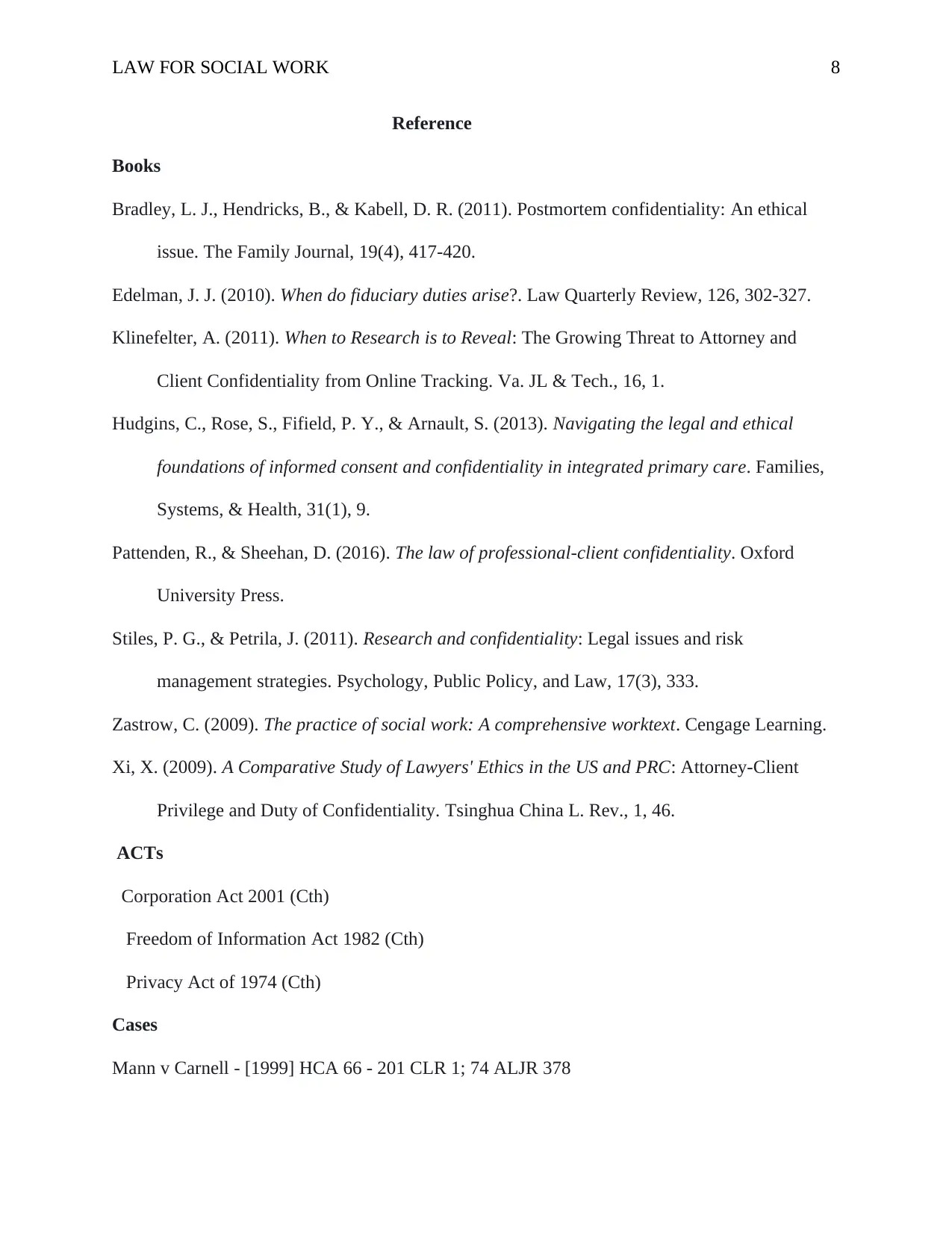
LAW FOR SOCIAL WORK 8
Reference
Books
Bradley, L. J., Hendricks, B., & Kabell, D. R. (2011). Postmortem confidentiality: An ethical
issue. The Family Journal, 19(4), 417-420.
Edelman, J. J. (2010). When do fiduciary duties arise?. Law Quarterly Review, 126, 302-327.
Klinefelter, A. (2011). When to Research is to Reveal: The Growing Threat to Attorney and
Client Confidentiality from Online Tracking. Va. JL & Tech., 16, 1.
Hudgins, C., Rose, S., Fifield, P. Y., & Arnault, S. (2013). Navigating the legal and ethical
foundations of informed consent and confidentiality in integrated primary care. Families,
Systems, & Health, 31(1), 9.
Pattenden, R., & Sheehan, D. (2016). The law of professional-client confidentiality. Oxford
University Press.
Stiles, P. G., & Petrila, J. (2011). Research and confidentiality: Legal issues and risk
management strategies. Psychology, Public Policy, and Law, 17(3), 333.
Zastrow, C. (2009). The practice of social work: A comprehensive worktext. Cengage Learning.
Xi, X. (2009). A Comparative Study of Lawyers' Ethics in the US and PRC: Attorney-Client
Privilege and Duty of Confidentiality. Tsinghua China L. Rev., 1, 46.
ACTs
Corporation Act 2001 (Cth)
Freedom of Information Act 1982 (Cth)
Privacy Act of 1974 (Cth)
Cases
Mann v Carnell - [1999] HCA 66 - 201 CLR 1; 74 ALJR 378
Reference
Books
Bradley, L. J., Hendricks, B., & Kabell, D. R. (2011). Postmortem confidentiality: An ethical
issue. The Family Journal, 19(4), 417-420.
Edelman, J. J. (2010). When do fiduciary duties arise?. Law Quarterly Review, 126, 302-327.
Klinefelter, A. (2011). When to Research is to Reveal: The Growing Threat to Attorney and
Client Confidentiality from Online Tracking. Va. JL & Tech., 16, 1.
Hudgins, C., Rose, S., Fifield, P. Y., & Arnault, S. (2013). Navigating the legal and ethical
foundations of informed consent and confidentiality in integrated primary care. Families,
Systems, & Health, 31(1), 9.
Pattenden, R., & Sheehan, D. (2016). The law of professional-client confidentiality. Oxford
University Press.
Stiles, P. G., & Petrila, J. (2011). Research and confidentiality: Legal issues and risk
management strategies. Psychology, Public Policy, and Law, 17(3), 333.
Zastrow, C. (2009). The practice of social work: A comprehensive worktext. Cengage Learning.
Xi, X. (2009). A Comparative Study of Lawyers' Ethics in the US and PRC: Attorney-Client
Privilege and Duty of Confidentiality. Tsinghua China L. Rev., 1, 46.
ACTs
Corporation Act 2001 (Cth)
Freedom of Information Act 1982 (Cth)
Privacy Act of 1974 (Cth)
Cases
Mann v Carnell - [1999] HCA 66 - 201 CLR 1; 74 ALJR 378

LAW FOR SOCIAL WORK 9
⊘ This is a preview!⊘
Do you want full access?
Subscribe today to unlock all pages.

Trusted by 1+ million students worldwide
1 out of 9
Related Documents
Your All-in-One AI-Powered Toolkit for Academic Success.
+13062052269
info@desklib.com
Available 24*7 on WhatsApp / Email
![[object Object]](/_next/static/media/star-bottom.7253800d.svg)
Unlock your academic potential
Copyright © 2020–2026 A2Z Services. All Rights Reserved. Developed and managed by ZUCOL.





